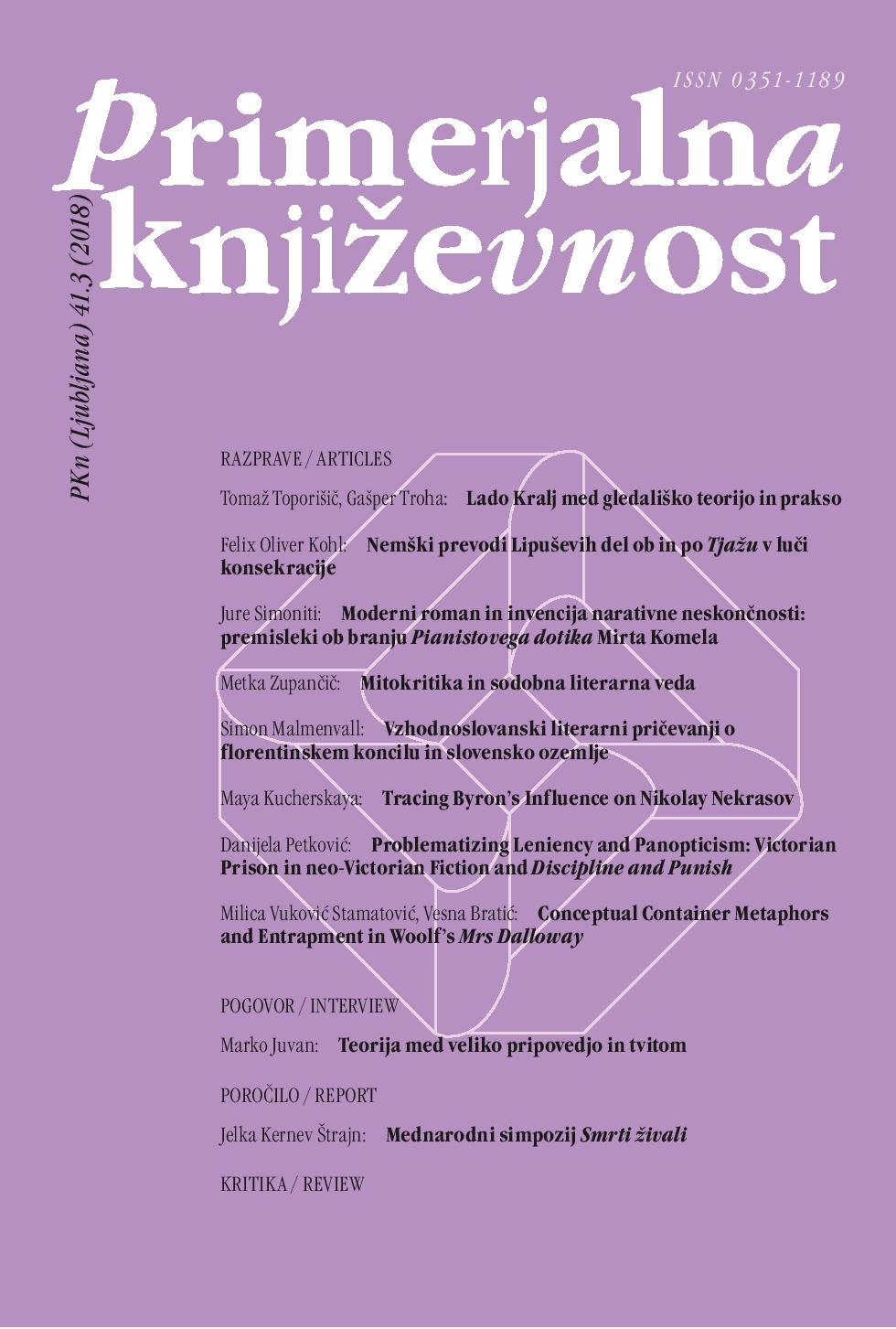Two East Slavic Literary Testimonies on the Council of Florence and the Slovenian Territory
Keywords:
literature and history, Muscovy, Russian literature, fifteenth century, Isidor’s Council, Journey to Florence, Council of Florence, Eastern orthodoxy, unionism, Slovenian territoryAbstract
The present article is based on a literary historical contextualization of the two East Slavic narrative texts from the mid-fifteenth century concerning the Council of Florence (1438–1439): the polemical treatise Isidor’s Council and the travel diary Journey to Florence. The author of this article claims that the two aforementioned texts are crucial in understanding the attitude of the elite of the late middle-ages Muscovy towards Europe and the Catholic Church. Regarding the Isidor’s Council, one of its most important features that should be paid special attention to is its “anti-Latin” polemical tone which decisively influenced the later Eastern Slavic perception of the question of unionism. As far as the anonymous Journey is concerned, two aspects should be pointed out: 1) this represents the first Eastern Slavic travel diary dedicated to the chosen economical and cultural characteristics of the Catholic Europe; 2) this diary is indirectly relevant also for the Slovenian history due to the fact that it explicitly mentions the term “slověn’ska zemlja” (словѣньска земля) which, according to some Slovenian (literary) historians, could correspond to the ancestors of the present-day Slovenes and represent one of the earliest implicit mentions of the Slovenians as a language community. Although the author of this article regards such an opinion as problematic, he recognizes the fact that the Journey places the wider area of the present-day Slovenian territory in a framework of the important European political and cultural currents of the late Middle Ages.References
Alpatov, Mihail A. Russkaja istoričeskaja mysl’ i Zapadnaja Evropa XII–XVII vv. Moskva: Nauka, 1973.
Akišin, Sergej J., in Boris N. Florja. »Isidor«. Pravoslavnaja éncilopedija. 27. Moskva: Cerkovno-naučnyj centr Pravoslavnaja énciklopedija, 2011. 177–182.
Borozdin, Aleksandr K. »Simeon, ieromonah Suzdal’skij«. Russkij biografičeskij slovar’. 18. Ur. Aleksandr A. Polovcov. Sankt Peterburg: Imperatorskoe russkoe istoričeskoe obščestvo, 1904. 458–459.
Čupković, Gordana. »Zapis popa Martinca kao spomenik književnog djelovanja«. Umjetnost riječi LIII.1–2 (2009): 1–27.
Droblenkova, Nadežda F. »Simeon Suzdal’skij«. Slovar’ knižnikov i knižnosti Drevnej Rusi. 2/II. Ur. Dmitrij S. Lihačëv. Leningrad: Nauka, 1989. 334–336.
Fennell, John. A History of the Russian Church to 1448. New York: Longman, 2006.
Gavrilov, Mihail N. Ferraro-florentijskij sobor i Rus’. New York: Fordham University Press, 1958.
Gill, Joseph. The Council of Florence. Cambridge: Cambridge University Press, 1959.
Granda, Stane. »Iz jezikovne skupnosti v politični narod«. Jeziki, identitete, pripadnosti med središči in obrobji: v počastitev 500. obletnice rojstva Primoža Trubarja. Ur. Kozma Ahačič in Petra Testen. Ljubljana: Založba ZRC, Inštitut za kulturno zgodovino ZRC SAZU, 2011. 215–246.
Grdina, Igor. »Neznanstveni temelji izgona Slovencev iz srednjega veka«. Proti nezgodovini. Ur. Igor Grdina. Ljubljana: Inštitut za civilizacijo in kulturo, 2014. 39–54.
– – –. »Pripadnosti in identitete med preteklostjo in vizijami prihodnosti«. Jeziki, identitete, pripadnosti med središči in obrobji: v počastitev 500. obletnice rojstva Primoža Trubarja. Ur. Kozma Ahačič in Petra Testen. Ljubljana: Založba ZRC, Inštitut za kulturno zgodovino ZRC SAZU, 2011. 9–20.
– – –. »Razumevanje jezika kot konstitutiva skupnosti«. Vozli zgodovine in spomina. Ur. Igor Grdina. Ljubljana: Inštitut za civilizacijo in kulturo, 2016. 35–52.
Gregory, Timothy E. A History of Byzantium. Chichester: Willey-Blackwell, 2010.
Halecki, Oskar. From Florence to Brest (1439–1596). New York: Fordham University Press, 1958.
»Hoždenie na Florentijskij sobor«. Biblioteka literatury Drevnej Rusi. 6. Ur. Dmitrij S. Lihačëv. Prev. Natalija A. Kazakova. Moskva: Institut russkoj literatury RAN, 1999. 464–487, 571–574.
Kazakova, Natalija A. »Evropejskie strany v zapiskah russkih putešestvennikov XV veka«. Voprosy istorii 33.6 (1977): 37–48.
– – –. Zapadnaja Evropa v russkoj pis’mennosti XV–XVI vekov. Leningrad: Nauka, 1980.
Kirillin, Vladimir N. »Hoždenie na Ferraro-Florentijskij sobor«. Istorija drevnerusskoj literatury: analitičeskoe posobie. Moskva: Jazyki slavjanskoj kul’tury, 2008. 459–468.
Krajcar, Jan, ur. Acta Slavica Concilii Florentini: Concilium Florentinum documenta et scriptores. 11. Prev. Jan Krajcar. Rim: Pontificum institutum orientalium studiorum, 1976.
Maleto, Elena I. Antologija hoženij russkih putešestvennikov XII–XV veka. Moskva: Nauka, 2005.
Malmenvall, Simon. »Florentinski koncil (1438–1439): uspehi in neuspehi reševanja uniatskega vprašanja«. Bogoslovni vestnik 74.3 (2014): 385–397.
– – –. »Kijevska Rusija in Pripoved o minulih letih«. Pripoved o minulih letih. Ur. Blaž Podlesnik. Ljubljana: Znanstvena založba Filozofske fakultete, 2015. 175–239.
Medic Vokač, Zlata. »Izidor, metropolit ruski«. Dialogi XII (1976): 559–570, 624–633.
Perrie, Maureen, ur. The Cambridge History of Russia: From Early Rus’ to 1689. Cambridge: Cambridge University Press, 2006.
Plokhy, Serhii. The Origins of the Slavic Nations: Premodern Identities in Russia, Ukraine, and Belarus. Cambridge: Cambridge University Press, 2006.
Popowska-Taborska, Hanna. Zgodnja zgodovina Slovanov v luči njihovega jezika (prev. Karmen Kenda Jež). Ljubljana: Založba ZRC SAZU, 2005.
Prokof’ev, Nikolaj I. Kniga hoženij: Zapiski russkih putešestvennikov XI–XV vv. Moskva: Sovetskaja Rossija, 1984.
Rotar, Janez. »Viri Trubarjevega poimenovanja dežel in ljudstev in njegova dediščina«. Zgodovinski časopis 42.3 (1988): 315–361.
Seemann, Klaus Dieter. Die altrussische Wallfahrtsliteratur. Theorie und Geschichte eines literarischen Genres. München: Fink, 1976.
Shepard, Jonathan. »General Introduction«. The Cambridge History of The Byzantine Empire, c. 500–1453. Ur. Jonathan Shepard. Cambridge: Cambridge University Press, 2008. 2–95.
Snoj, Marko. Slovenski etimološki slovar (tretja izdaja). Ljubljana: Založba ZRC SAZU, 2016.
Strohal, Rudolf. Čitanka iz književnih djela starih bugarskih, hrvatskih, srpskih i slovenačkih u I. periodu. Zagreb: Kraljevska zemaljska tiskara, 1921.


